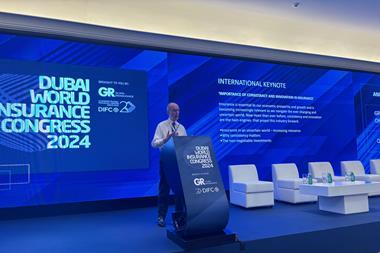For a company like G4S, a world-leading integrated security business operating in more than 90 countries, implementing a global programme that meets all your needs is no easy task. It’s a good thing changing provider to RSA proved to be a journey worth making.

Local compliance is especially critical for a business like security firm G4S, with operations spread across numerous jurisdictions, each with its own unique regulatory framework.
However, poor service from a previous insurer forced the company to look for a new partner that could provide a bespoke policy with cover tailored to meet local liability regulations.

Robert McNiff, group insurance manager at G4S, says: “The previous insurers didn’t have control over their network… We had issues where they were unable to provide professional indemnity policies locally, even though it was agreed under the master policy. Escalation to the highest levels in the UK proved fruitless, making our move necessary.”
“This wasn’t taken lightly. We didn’t move for premium or claims handling, it was purely service. We were in half a dozen countries without a locally compliant policy. If our clients had asked for a particular document, we simply wouldn’t have been able to provide it and this was unacceptable”
THE HUNT FOR A NEW INSURER
The subpar service and lack of compliance meant that the hunt was on for a new provider. McNiff explains that key priorities were finding an insurer that was prepared to be honest about what could be covered, particularly at the local level, and would look for solutions to areas of risk that might be more difficult to insure especially in some quite challenging countries.
It was crucial to find the right partner, given the administrative complexity of moving such a large programme, and due diligence was a vital component in ensuring a seamless transition. Ultimately, this search led to RSA.
“We know what bad looks like. And we had to make sure that if we moved a global programme that we had full confidence it would deliver.”
McNiff explains: “We wanted a partner that remembered they’re in the risk transfer business, were willing to work with G4S, to find solutions, and to not provide a ‘slow no’ to anything slightly off-piste.”
“We know what bad looks like. And we had to make sure that if we moved a global programme, with all the upheaval it would cause, that we had full confidence it would deliver. So, we probably went through more due diligence than we would otherwise. I spoke to four RSA clients to get a good, rounded view of what it felt like to be an RSA client.”
MAKING THE TRANSITION
Once RSA had been selected as the provider of the global programme, then began the lengthy process of setting up the new cover.
Of course, transferring a massive international programme is laden with challenges, from securing local compliance, to ensuring that all administrative processes are correctly aligned.
McNiff says that a methodical and well-managed approach was key to the project’s success. He explains: “Preparation upfront and taking care of the dull, mundane admin tasks at the beginning is crucial. Failing at that part means you’ve failed the whole project.”
The importance of a proactive approach was echoed by RSA, who stressed the need for active engagement at all levels.
Barbara O’Reilly, global network director at RSA, says: “It’s the way we approach these things generally. You’ve got to have a project team around it, especially for that initial setup because things can go wrong at the outset. Do the preparation upfront.”
“Preparation upfront and taking care of the dull, mundane admin tasks at the beginning is crucial.”
One key element of focus was making sure that RSA’s local network could deliver locally compliant cover. RSA predominantly operates with a network of partners, who all needed to be prepared to provide the local policies. Where partners couldn’t meet the requirements, solutions needed to be found.
RSA customer director Colin McPhie says: “Rather than just saying ‘Here’s what we can do, take it or leave it,’ it was about getting creative. We always went in with a solution-oriented approach rather than being rigid… And I think that makes a huge difference.”
He adds that G4S’ broker, Marsh, was very helpful in the few countries where new partners were required: “They were instrumental in helping the programme run more smoothly where additional support was necessary.”
A final key area of focus was claims. G4S wanted to be able to handle its own claims, which meant that this system needed to be bespoke as well. This came with regulatory processes that needed to be approved.
McNiff says: “I don’t know many clients that handle their own claims up to a reasonably high level, but that has been the case within G4S for many years. We needed RSA to feel comfortable that we had the capability to manage these claims. Yes, the amounts are within our captive’s retention, but it’s still a reinsurance captive.”
LEARNING LESSONS
Ultimately, both RSA and G4S agree that good communication was at the heart of what made the transfer successful.
McNiff says: “It’s critical as there will always be bumps in the road on both sides, but as long as we can speak openly to each other, then that’s where you can truly rely on your partner. When something is dragging a bit, we know that we can pick up the phone or send an email to get it moving.”
For organisations considering a similar move he stresses the importance of getting the ball rolling as early as possible, and says it is critical to do your due diligence. He adds: “Start early, even the day after your renewal isn’t too soon. Meet with potential markets, be realistic about the timeframe and put in the effort.
“As long as we can speak openly to each other, then that’s where you can truly rely on your partner.”
“Speaking with current and even former clients, understanding the insurer’s network – these are all critical steps. It’s essential to ask the insurers to be absolutely honest about their capabilities. If they aren’t ready now, you should know that upfront.”
A year and a half into the relationship, the results are overwhelmingly positive. McNiff concludes: “The relationship is 1,000% better than what we had. The local compliance area is key… and there is a willingness to find solutions. It has certainly addressed the issues, and we get on well, which is a bonus”











No comments yet